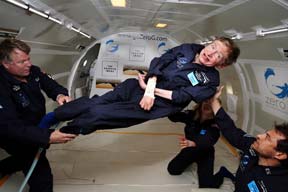The Resiliency of Stephen Hawking

By Glen Fahs
At the age of 21, Stephen Hawking suffered one of the worst diseases known to humanity: Amyotrophic Lateral Sclerosis (ALS), also known as Lou Gerhig's disease. He was predicted to live only two more years, five at the outside, and yet, despite losing almost all physical control, he lived until he was 76 and better than anyone, helped the world understand the mysteries of the universe. Why? How?
A theoretical physicist, Hawking believed his passion for science helped his body, and especially his mind, resist the decline other ALS victims experience. He wrote a bestseller, A Brief History of Time, which, despite its esoteric exploration, sold 10 million copies.
The fifth and highest stage of resiliency is serendipity, which involves making the worst experience of one's life the most valuable. Hawking was a phenomenon at doing just that. Not having use of his body gave Hawking time to think, to innovate, and to advance science and popular understanding. He stepped outside the box by appearing on The Big Bang Theory, the most popular comedy of recent years, as well as several times — in animated form — on The Simpsons, the longest running comedy on TV. His sense of humor was undoubtedly a way to rise above his tragedy.
We can see Hawking as a special case, and, of course, like any star, he is. He had technological advantages and a spectacular brain that scientists would love to preserve. But whether we are discussing Abraham Lincoln, Oskar Schindler, Susan B. Anthony, Martin Luther King, Madame Curie or others who amazingly overcame devastating experiences and immense obstacles, the best role models can be emulated in our much less famous lives. We can all thrive on challenge and get up after being knocked flat. In our world, we can be role models too.
If you would like to read more about what made Stephen Hawking tick, grab a copy of his memoir, My Brief History.
(Photo of Stephen Hawking in a zero gravity airplane, 2007, courtesy NASA, via Wikimedia.org)
Glen Fahs, PhD, has been a coach and leader for decades in the fields of training, resiliency, continuing education, change and transition. He has high-level training experience in government, nonprofit and the private sector and has taught for 12 colleges and universities. He has served on several boards, including currently on the Al Siebert Resiliency Center board. If you would like a resiliency coach, speaker or trainer, call Glen at 971-570-0159. To become certified for resiliency work, please see the guidelines on the Al Siebert Resiliency Center website: ResiliencyCenter.com.
